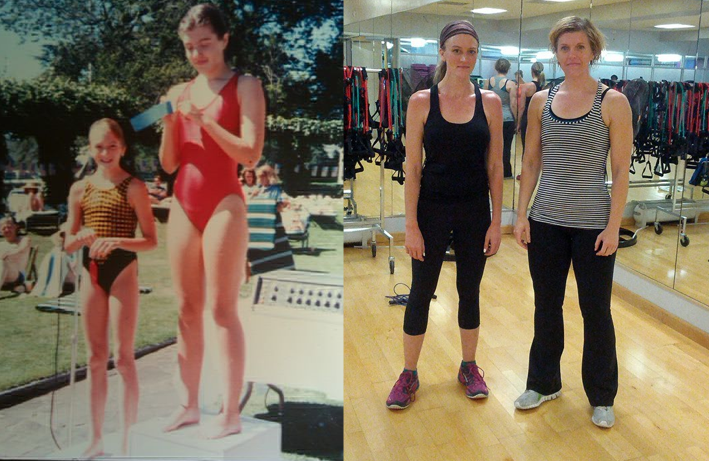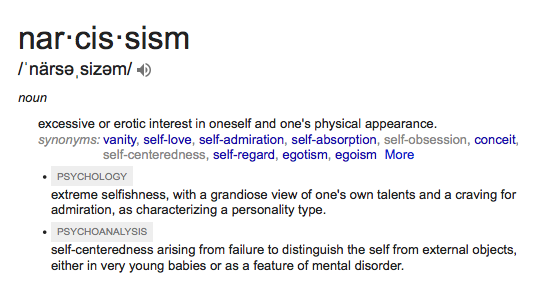A theme I run up against frequently is the idea that people who don't conform to societal weight expectations either don't love themselves or SHOULDN'T love themselves. Because self acceptance translates to complacency in some people's minds, and therefore they claim that 'self love is an excuse to be fat and lazy'. People who weigh more than is socially acceptable are told every day, both directly and indirectly through advertising, that they don't deserve to feel good about themselves, that the only way to become more socially acceptable is through self-punishment and self-hate. This couldn't be further from the truth, and in fact there is scientific evidence that people who are kind and gentle with themselves (termed 'self-compassion’ in the study I'm going to discuss) are actually MORE successful in changing their behavior, and therefore are much more likely to be successful in long-term maintenance of a healthy weight and other health promoting behaviors.
I have direct personal experience here. I spent decades hating myself, hating my body, trying to punish my body into being smaller than it was. The result was always frustration, binging and increasing weight over time. And then one day I decided to stop hating myself and instead treat myself with kindness and patience. And that fundamental change in mindset put the behavior changes into effect that resulted in lasting and sustainable weight loss and health improvement.
Self-Compassion
Have you ever wondered why some people seem to fare better emotionally and mentally than others do, in the quest for fitness, health improvement or weight loss? They seem to have patience with themselves, with the process, and with the steps needed for permanent results. They’re kinder to and more satisfied with themselves, more understanding of the troubles of others, and have a realistic outlook. Typically, they achieve healthier and more lasting physical results.
On the other hand, there are people who beat themselves up constantly, who are impatient with themselves, get frustrated and freak out when the process doesn’t comply with their wishes quickly enough, who try to skip necessary steps. They seem unkind to and unsatisfied with themselves, and are frequently scornful or resentful of others. They are often the people who jump from one fad diet or punishing exercise regimen to another, seeking immediate, extreme results.
We hear a lot about self-esteem, see it promoted as a determining factor in people’s levels of happiness, satisfaction and success in life, but there’s much less awareness of the concept of self-compassion. At first glance, self-esteem and self-compassion may appear to be the same. However, there’s a subtle but important difference.
What is self-compassion? I'm going to use a few quotes from http://www.self-compassion.org/, a site run by Dr. Kristin Neff, a pioneering researcher into the concept of self-compassion, to help elucidate the concept before I get into the science of self-compassion:
“Instead of mercilessly judging and criticizing yourself for various inadequacies or shortcomings, self-compassion means you are kind and understanding when confronted with personal failings ' after all, who ever said you were supposed to be perfect? You may try to change in ways that allow you to be more healthy and happy, but this is done because you care about yourself, not because you are worthless or unacceptable as you are.”
It’s an unfortunate fact that the concept embodied by the term “self-compassion” is often viewed as weakness in our society. Being compassionate towards others is seen as virtuous. But to extend that same compassion to oneself is generally seen as either self-absorbed or undisciplined. We are expected to “be hard on ourselves”, to be self-punishing and ashamed about shortcomings or failure to live up to standards (regardless of whether those standards are reasonable or humane).
How does self-compassion differ from self-esteem? Again, from Dr. Neff’s site:
“Self-esteem refers to our sense of self-worth, perceived value, or how much we like ourselves…The need for high self-esteem may encourage us to ignore, distort or hide personal shortcomings so that we can't see ourselves clearly and accurately…our self-esteem is often contingent on our latest success or failure, meaning that our self-esteem fluctuates depending on ever-changing circumstances.
In contrast to self-esteem, self-compassion is not based on self-evaluations…This means that with self-compassion, you don't have to feel better than others to feel good about yourself. Self-compassion also allows for greater self-clarity, because personal failings can be acknowledged with kindness and do not need to be hidden. Moreover, self-compassion isn't dependent on external circumstances, it's always available ' especially when you fall flat on your face!”
So…what's the evidence?
There’s a fascinating report on a series of five studies that examined the behavior of people with higher levels of self-compassion, as compared with people with lower self-compassion and/or lower or higher levels of self-esteem, Self-Compassion and Reactions to Unpleasant Self-Relevant Events: The Implications of Treating Oneself Kindly. The full report can be found at here.
The researchers gathered reports from participants on negative events in their lives, presented hypothetical scenarios, recorded reactions to interpersonal feedback, showed participants recorded performances by others in awkward situations and observed their reactions, and asked them to reflect on negative personal experiences.
Some findings from this report include:
“…self-compassion was positively associated with mastery orientation (being motivated by curiosity and the desire to develop one’s skills) but negatively associated with performance orientation (the motivation to defend or enhance one’s self-worth).”
(Layman’s terms: People who were more self-compassionate were more likely to be motivated by how a behavior made them feel, and less likely to be motivated by how it made them look.)
“self-compassion was consistently associated with having fewer negative, pessimistic, and self-critical thoughts…self-compassion was inversely related to believing that one has bigger problems in life than most other people, wondering why “these things always happen to me,” thinking that one’s life is more “screwed up” than other people’s, and having the thought “I’m a loser.””
(Layman’s terms: People who were more self-compassionate tended not to believe that their problems were worse than everyone else's (what I see as victim-mentality), and tended to be more optimistic.)
“…self-compassion was negatively related to negative feelings, specifically, anxiety, sadness, and self-conscious emotions.”
(Layman’s terms: Self-compassionate people had fewer negative feelings and showed less anxiety and self-consciousness.)
“…self-compassionate people react with greater equanimity to difficult situations than people who are lower in self-compassion…self-compassionate people are assumed to be able to maintain emotional equanimity while seeing themselves accurately (without either self-enhancing or self-deprecating) because they compassionately recognize their own imperfect humanity.”
(Layman’s terms: Self-compassionate people tended to react to difficult situations in a more balanced and stable way, and to have a more realistic perception of their own strengths and weaknesses.)
How does this apply to fitness, health and weight loss? It’s common to hear people ridicule or devalue themselves for being unable to stick with healthy behaviors. Most of us have probably heard people say something like, “I was so bad today! I ate too much and didn’t exercise, I’m such a pig!” Even people who don’t express those types of thoughts out loud commonly think those things about themselves. Our culture endorses self-punishment for “cheating” on diets, eating “too much” or “junk food”, not exercising enough, and not conforming to the very narrow range of socially 'acceptable' standards of attractiveness.
Eating a balanced, sensible diet and engaging in regular physical activity are essential to achieving and maintaining fitness and a healthy weight. However, shaming and vilifying ourselves for perceived failures isn’t a sustainable way of motivating ourselves to establish these healthy habits. If we believe we aren’t worthy of compassion when we don’t meet certain standards, we are unlikely to have positive motivation to develop and maintain lifelong habits that support health. It’s like the difference between punishing misbehavior or positively reinforcing good behavior. The former isn't as effective as the latter; the latter is more likely to inform and shape positive behavior for life.
When we care about ourselves; when we truly believe we are worthy of understanding and compassion from ourselves as well as from others; when we believe that we deserve good health and deserve to feel attractive as we are; when we take responsibility for our own behaviors without harshly judging them; when we view ourselves honestly…we are much more likely to maintain a lifestyle that promotes those healthy behaviors.
If we DON'T see ourselves as worthy of any of those things; if we vilify ourselves for our behaviors; if we deflect responsibility for our own behaviors by trying to justify them or blame them on others; when we have a distorted view of ourselves…we are less likely to follow through with healthy habit changes and more likely to continue self-sabotaging behaviors that are harmful to our well being.
When it comes to exercise, self-compassion may give us more incentive to find and continue activities that develop a higher level of fitness without the damaging effects of certain extreme exercises. The finding that “…self-compassion was positively associated with mastery orientation (being motivated by curiosity and the desire to develop one’s skills) but negatively associated with performance orientation (the motivation to defend or enhance one’s self-worth)” may indicate that those with higher self-compassion are more likely to stick with an activity because of the intrinsic motivation of satisfaction with acquiring and mastering skills. We continue engaging in an activity because we enjoy it! And because it makes us feel good! On the other hand, “performance orientation” would be extrinsic motivation, a focus on external factors such as a prize, recognition or praise, or a certain aesthetic goal in order to more closely adhere to social standards of attractiveness. An example of extrinsic motivation is engaging in an activity because a partner wants you to, or because you believe it will produce a certain aesthetic. Intrinsic motivation (doing something out of a sense of personal enrichment, or because of the way it makes you feel) has been shown to be more sustainable than extrinsic motivation (doing something in order to receive praise or approval from others or project a certain image).
People with more self-compassion may be more likely to recognize that extreme and punishing diet regimens are counter-productive. Dietary ‘purity’ is a rigid concept that rarely allows for pleasure or social bonding with food. Self-compassion allows for the knowledge that it’s okay to enjoy food, to not feel deprived, to eat in a way that serves one’s nutritional needs and health goals but allows for pure enjoyment as well. The binge/restrict cycle that is so common today is associated with a self-hostile mindset, and with a pattern of alternating self-loathing and repentance. A higher level of self-compassion could illuminate that unhealthy cycle and help people break free of it. Many people try to break the binge-restrict cycle at the binge, which usually doesn't work. A person with a higher level of self-compassion is more likely to recognize that they can break the pattern at the restriction point, rather than the binge. Self-compassion recognizes that the restriction is a form of self-punishment, and that the binge is the natural response to such punishment. Stop the self-punishment, and the binge response will begin to fade.
The finding that “…self-compassionate people react with greater equanimity to difficult situations…” could give a clue to another key feature of people with more consistent satisfaction and results. Equanimity is a state of psychological stability and composure. With equanimity comes a resistance to extreme reactions. It allows for a less catastrophic mindset, but also less irrational, unsupported optimism, allowing more accurate assessment of situations and greater ability to make rational decisions about future actions. Self-compassion allows for a reasoned, balanced response to difficult situations and setbacks, rather than the cycle of bouncing between two extremes that so many people are trapped in.
How do you determine if you have self-compassion? Dr. Neff has a quiz on her site that can help you guage your own level of self-compassion. This is also a subject that you should be able to discuss with a therapist. If you have a high level of self-critical thoughts, I highly recommend working with a therapist to learn tools to reach a more balanced self-image. Also, keep in mind that many of the benefits attributed to high self-esteem may, in fact, be a result of high self-compassion instead, so focusing on self-esteem to the exclusion of self-compassion may not be beneficial. The studies cited above found many indications of this, and recommended further study of this distinction.
The report on the five studies concludes, “In general, these studies suggest that self-compassion attenuates people’s reactions to negative events in ways that are distinct from and, in some cases, more beneficial than self-esteem.” This means that those with higher levels of self-compassion may be better equipped to deal with life’s challenges, and have advantages over those with high self-esteem but not high self-compassion.
How do you develop and maintain self-compassion? Again, working with a qualified therapist may be of great value. Dr. Neff also has free exercises available on her site meant to develop self-compassion. In essence, these types of exercises promote being mindful of your own level of self-compassion and learning how to treat yourself the way you would treat a close friend, the way you would want a close friend to treat you. This may feel uncomfortable to many people at first, because so much about our society conditions us to suppress any innate self-compassion we may have, tells us that self-compassion is weakness and undesirable. Most of us experience constant exposure to advertising and social messages that tell us we aren’t good enough as we are. We’re bombarded with unreasonable beauty standards, a greater level of social praise and acceptance for certain categories of professions or socio-economic status, and pressure to compare ourselves to others in order to gauge our own worth. Those things actively discourage self-compassion, and some people are more susceptible to those pressures than others.
I think we can all learn to break away from those patterns, to develop and practice the skills and mindset that promote the ability to stick with the consistent, healthy habits that give us the power to transform ourselves. Once those habits, mental tools and attitudes are developed, maintaining them is relatively easy (much like a muscle!). Along with them comes a greater clarity about the destructive effects of extremes, and a comfort and surety about the value of continuing to practice self-compassion and the behaviors it supports.



